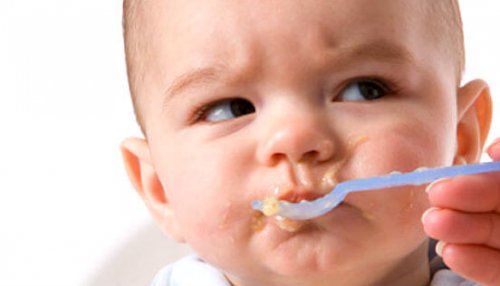My Baby Refuses to Eat: What Should I Do?

First, discover the reason why your baby refuses to eat
Pediatricians suggest we should first identify the moment in which your child started refusing food.
If your child has always refused to eat, then one of the following explanations may be true:
- Acid reflux: Acid reflux occurs when a baby doesn’t produce enough stomach acid in order to process foods. Generally, this problem fixes itself after your little one’s first weeks of life. Reflux also occurs when your child produces too much acid. In this case, your child will cry each time he eats because the reflux causes pain.
- Lactose intolerance: This occurs when a body doesn’t produce enough lactose. This enzyme is necessary for processing dairy (this doesn’t include cheese and yogurt, since these dairy products are already fermented). Lactose intolerance produces intestinal pain. Keep in mind that if your child has this type of food intolerance, he’ll likely present others as well.
- Parents’ unrealistic expectations: Babies eat out of need, not out of obligation. Many times, parents insist that their children don’t eat enough, when the problem isn’t actually the baby. Rather, it’s the parents’ unrealistic expectations.

Now, if your child’s refusal to eat is a new thing, then you should identify the issue as soon as possible. This will help you correct the issue early on.
The most common causes of food refusal are:
- Digestive issues: Digestive issues usually appear in the form of diarrhea, abdominal cramping, discomfort and also vomiting.
- Your child may be suffering from some other type of illness. In this case, it’s normal for your child to have a lack of appetite. For example, when your child has the flu or fever, then it’s normal if she doesn’t want to eat.
Tips for getting your child to eat
Once you’ve identified the cause, it’s time to figure out the best way to encourage your baby to eat.
There are simple techniques we can use to help our baby develop a different attitude towards food. Here are five tips:
- Make mealtime an enjoyable experience. Remember that during your child’s first years of life, he absorbs everything he perceives and relates it with good and bad. If feeding time takes place in a calm environment, this will help your child perceive eating as something positive.
- Be careful with temperatures. Your baby still doesn’t know what is hot and what is cold. Therefore, try to serve each food at the correct temperature.
- Avoid processed foods like honey, tea, or infusions. Your baby’s body isn’t ready to digest these foods. Choose natural foods and try to offer a variety of fruits. Apple sauce and natural yogurt are some of your best options.
- Be careful with hygiene, both yours and your baby’s. Your hands and your baby’s hands should be clean in order to handle food, as should the dishes and utensils you’re using.
- Don’t force your child to eat things she doesn’t like. Your little one is discovering new flavors and textures all the time. The fact that she doesn’t like a fruit or vegetable at first doesn’t mean she’ll never come to like it. Give her time and offer other alternatives.
When is the right time to give your baby foods other than breast milk or formula?
After 4 or 6 months of age, you can start offering your baby other types of food, especially fruits and vegetables.
It’s important to incorporate different ingredients into your baby’s diet little by little.
This way you’ll discover which flavors they like and don’t like. You’ll also start to tell which temperature works best for them (if the foods are hot or cold) and other relevant aspects regarding your baby’s diet.

The World Health Organization recommends breastfeeding your child exclusively until your baby is 6 months old. From then on, states the WHO, it’s time to start incorporating other foods into your child’s diet.
Choose foods that are appropriate for your child’s age and safe for him to eat. Remember, your child’s teeth likely haven’t come in yet, so he can’t chew.
We recommend trying mashed potatoes or vegetables, mashed apple or pear, carrot juice, and other healthy, natural options.
Should I talk to a specialist if my baby doesn’t want to eat?
Once again, let’s look at the starting point. It’s very important not to become alarmed, and to identify the reason behind your child’s refusal to eat.
It may be due to something circumstantial. Or it may be a sign of an issue with a specific food or its preparation.
Of course, if symptoms appear that deserve to be brought to a doctor’s attention, make an appointment. The same is true if your child’s lack of interest continues for an extended period of time.
All cited sources were thoroughly reviewed by our team to ensure their quality, reliability, currency, and validity. The bibliography of this article was considered reliable and of academic or scientific accuracy.
- Papa, Y. (2019f, 7 febrero). Alternativas saludables para intolerantes a la lactosa. Recuperado de https://mejorconsalud.as.com/alternativas-saludables-intolerantes-la-lactosa/
- Benítez, C. A. V. (2014). Actualización sobre enfermedad por reflujo gastroesofágico en niños. Revista Colombiana de Gastroenterología, 29(1), 55-62.